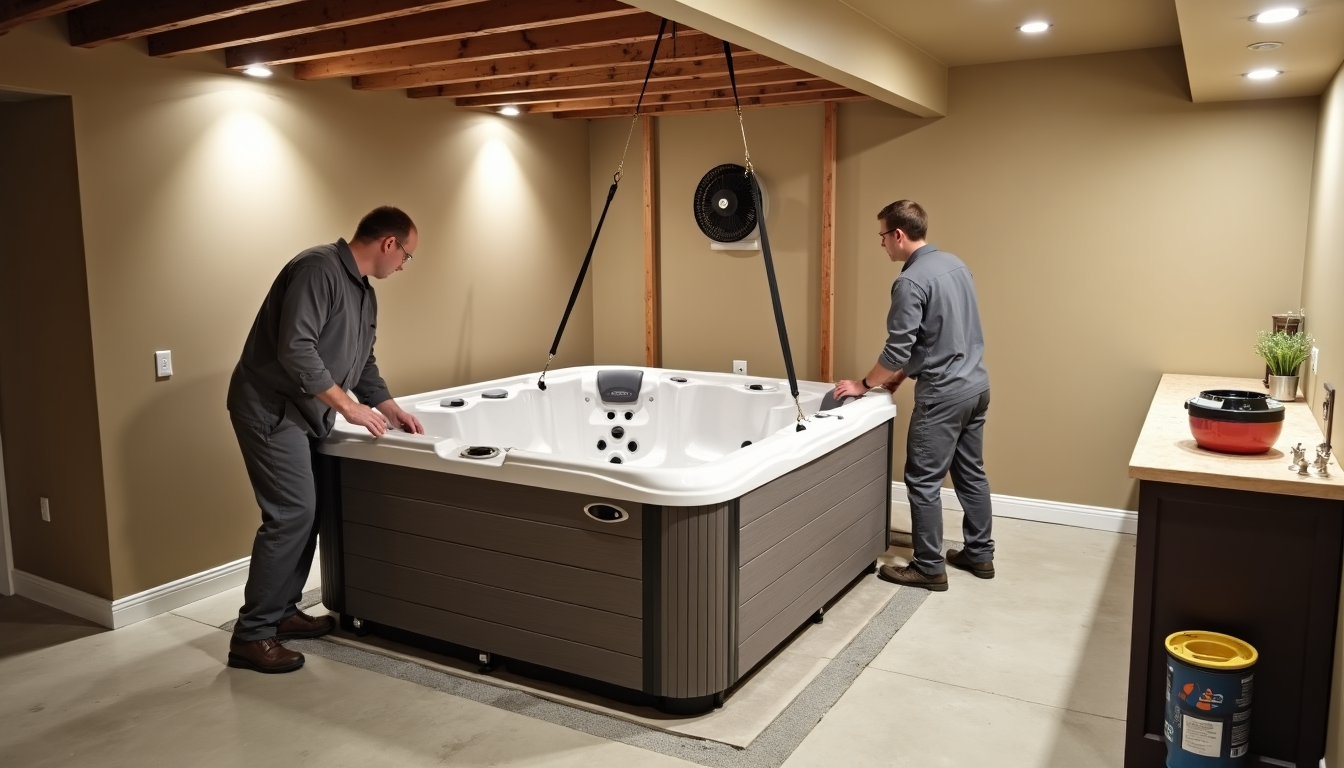Table of Contents - How to Install a Hot Tub in Basement: A Complete Guide
This blog post may contain affiliate links. As an Amazon Associate I earn from qualifying purchases.
How to Install a Hot Tub in Basement: A Complete Guide
 You also need to consider what temperature is too cold for a hot tub
You also need to consider what temperature is too cold for a hot tub
Is it suitable for you to have a hot tub in a basement?
Assessing Floor Strength and Weight Capacity
- Start with the hot tub’s dry weight
- Add water weight (1 liter = 1 kilogram or 2.2 pounds)
- Count in about 185 pounds per person who might use it
- Divide by your hot tub’s square footage to get pounds per square foot
Measuring Space Requirements
- Include the hot tub dimensions plus extra space around it
- Keep 18-24 inches clear on all sides for maintenance access
- Check that your ceiling is high enough for comfortable sitting and standing
- Don’t forget space for steps or entry points
Pros and Cons of Basement Hot Tub Installation
Pros
- Year-round use regardless of weather
- Concrete floors typically suitable for weight
- Enhanced privacy
- Can create complete spa environment
- Security from unauthorized access
Cons
- Requires proper ventilation system
- Potential moisture/humidity issues
- Limited space may restrict tub size
- More complex installation process
- May require structural assessment
Checking Access Points for Installation
- 8 feet of clearance if moving the hot tub flat (easiest way)
- Minimum 40 inches of clearance if tipping the hot tub on its end
- Stairs or flat pathways
- Tight corners that might cause traffic jams
- Doorway and hallway widths along the entire path
accessing the hot tub for maintenance
Essential Preparations Before Installation
Waterproofing Your Basement
Do’s and Don’ts of Basement Waterproofing
Do’s
- Apply waterproofing render with moisture-reducing agents
- Create a PVA wash or use masonry sealant on concrete surfaces
- Install waterproof vapor barriers on wood studs/rafters
- Use swimming pool grade adhesive and grout (not bathroom grade)
Don’ts
- Use rubber or latex-based sealants that might interfere with tile adhesion
- Skip waterproofing steps even if your basement seems dry
- Rely solely on tiles and grout for water resistance
- Attempt to waterproof without proper surface preparation
Planning for Proper Ventilation
- Measure your room’s dimensions (length × width × height)
- Divide the cubic footage by 3 to find required CFM (cubic feet per minute)
- Get an exhaust fan that meets or exceeds this CFM value
- Exhaust fan with humidistat control
- Heat Recovery Ventilator (HRV) that removes humidity while keeping the warmth
- Mechanical ventilation systems that constantly exchange fresh air
Setting Up Electrical Requirements
- Hiring a licensed electrician (this isn’t a DIY project!)
- Ground Fault Circuit Interrupter (GFCI) protection
- Dedicated circuit (your hot tub doesn’t like to share power)
- Proper wire gauge based on distance and load
- Disconnect switch that’s accessible but at least 5 feet from water
- Most hot tubs need 220V/240V with 50A-60A circuit breakers
Creating Effective Drainage Solutions
- How close are existing floor drains?
- Do you need a dedicated drain line?
- Should you use a submersible pump where gravity drainage isn’t possible?
Step-by-Step Hot Tub Installation Process
Transporting the Hot Tub into Your Basement
- Through a walk-out basement or wide staircase
- Via a basement window or other opening
- Through the house if doorways are wide enough
- At least three strong friends (bribes of future hot tub parties work well!)
- Furniture dollies or 4-inch PVC pipes for rolling
- Moving blankets to protect the cabinet
- Furniture plastic wrap to secure everything
Transport Do’s and Don’ts
| Do | Don’t |
|---|---|
| Measure all doorways and tight corners first | Stand under a hot tub tipped on its side |
| Use furniture dollies on firm surfaces | Attempt to lift the entire hot tub |
| Keep the hot tub on its side | Rush through narrow passages |
| Protect the cabinet with moving blankets | Forget to secure the tub with straps |
Positioning and Leveling
- Place it on a level concrete surface
- Keep 18-24 inches of clearance around all sides for maintenance
- Position away from electrical panels or outlets (minimum 5 feet)
- Make sure the equipment compartment stays accessible
Connecting Electrical Components
- Install a dedicated circuit (typically 220V/240V with 50-60A breaker)
- Add GFCI protection to keep everyone safe
- Run wiring through PVC or metal conduit
- Position all circuit breakers and disconnects at least 5 feet from the tub
- Bond all metallic components according to code
Plumbing and Drainage Setup
- Find your water source – ideally a nearby faucet for hose connection
- Make sure a drain is accessible – either an existing floor drain or pump solution
- For basements without gravity drainage, install a sump pump
- Test everything for leaks with running water before the final setup
Recommended Products for Basement Hot Tubs
Best Compact Hot Tubs for Limited Spaces
Pros and Cons of Compact Hot Tubs
Pros
- Easier to transport into basements
- Lower water volume reduces structural demands
- Energy-efficient operation
- Tool-free cabinetry for simple maintenance
Cons
- Fewer seating positions
- Limited jet configurations
- Smaller footwell area
- Less therapy options
Essential Ventilation Systems
Essential Ventilation Features
| Product | Key Benefits |
|---|---|
| Commercial Dehumidifiers | Removes excess moisture, prevents mold growth |
| Exhaust Fans with Humidistats | Automatically activates when moisture levels rise |
| HRV Systems | Recovers heat while exchanging air, reducing energy costs |
Waterproofing and Moisture Control Products
- Apply to completely dry surfaces (moisture content below 3%)
- Give it proper curing time (6-7 days for submerged applications)
- Use multiple coats where water exposure is direct
- Team it up with good ventilation for total moisture control
Maintaining Your Basement Hot Tub
Regular Cleaning Procedures
- Weekly cleaning: Grab some white vinegar and scrub those shell walls and jets to banish scum lines and prevent buildup.
- Filter maintenance: Give those filters a good rinse with your garden hose monthly, then treat them to a proper soak in filter cleaner every three months.
- Quarterly draining: Empty and deep clean your hot tub every 3-4 months (more often if you’re hosting frequent splash parties!).
Do’s and Don’ts of Hot Tub Cleaning
| Do | Don’t |
|---|---|
| Clean scum line weekly with vinegar | Use household cleaning products |
| Wipe down cover with 10% bleach solution | Combine chemicals or cleaning solutions |
| Remove and clean pillows separately | Allow people inside during cleaning |
| Turn off power before draining | Use bleach inside your hot tub |
Water Chemistry Management for Indoor Spas
- Test water 2-3 times weekly with test strips (they’re super easy to use!).
- Keep these chemical levels in check:
- pH: 7.4-7.6 (think slightly alkaline)
- Alkalinity: 80-120 ppm (your pH’s bodyguard)
- Chlorine: 1-3 ppm or Bromine: 3-5 ppm (the germ fighters)
- Shock your hot tub weekly to knock out contaminants and keep water crystal clear.
Preventing Moisture Damage
- Ventilation: Make sure your ventilation system complies with local codes – this isn’t a place to cut corners.
- Dehumidification: Put a dehumidifier near your hot tub to pull excess moisture from the air.
- Moisture barriers: Regular drywall and water are sworn enemies! Consider concrete board instead to prevent soggy walls.
FAQs
How Long Will My Basement Hot Tub Last?
Should I Keep My Hot Tub Running All The Time?
What Temperature Should I Set When Not Using My Hot Tub?
Does My Basement Hot Tub Require Special Drainage?
How Much Ventilation Does A Basement Hot Tub Need?
Final Thoughts – Hot Tub in Basement
- Make sure your floor can handle the weight
- Waterproof, waterproof, waterproof!
- Ventilation isn’t optional – it’s essential
- Regular maintenance keeps everything bubbling happily



